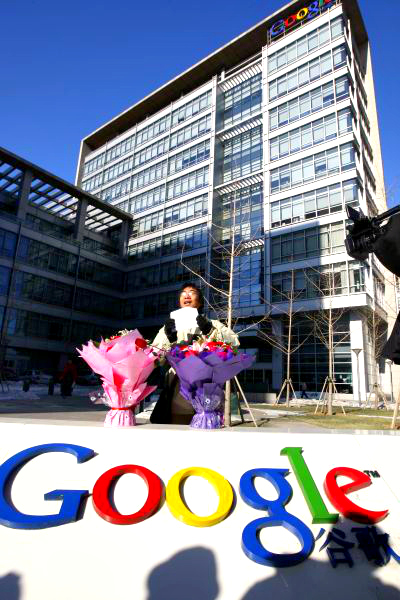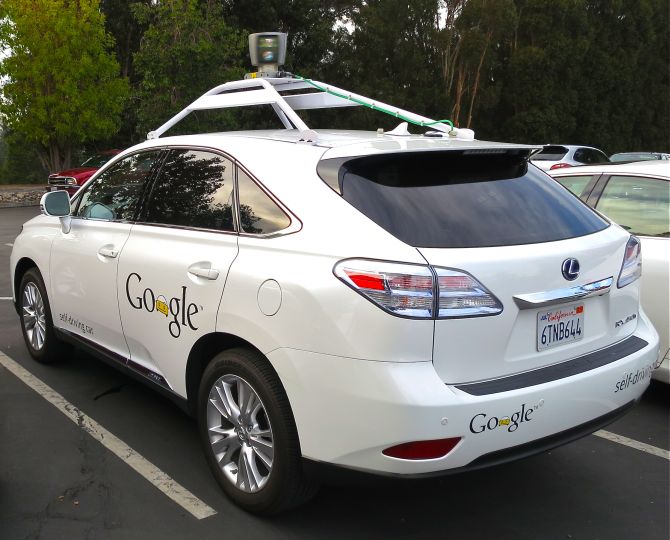Photographs: Bobby Yip/Reuters Yoshita Singh in New York
India's entrepreneurial innovators have the potential to build the ‘next Google’ if the country ‘plays its cards right’ and ensures Internet access for millions of its citizens, Google's executive chairman Eric Schmidt has said.
In an essay written for the book Reimagining India: Unlocking The Potential of Asia's Next Superpower edited by global consulting firm McKinsey, Schmidt dubbed India 'an Internet laggard' saying he feels Internet in the country today is like where it was in America in about 1994 -- four years before Google was even born.
He said India must increase its Internet penetration across towns and cities, a move that will have a positive impact on its economy and society.
. . .
Indian entrepreneurs can build next Google: Schmidt
Image: Google co-founder Sergey Brin walks the runway wearing new product 'Glass by Google'.Photographs: Andrew Kelly/Reuters
The former Google chief executive officer said he witnessed the creative potential of India's people all around him in Silicon Valley where India-born entrepreneurs account for 40 per cent of start-ups.
"Just think what will happen when India's entrepreneurial innovators are able to create great global companies without leaving their country.
“They will change the world. Hundreds of large firms focused on the Internet will be founded and will succeed by focusing purely on Indian consumers, Indian taste, Indian style, Indian sports.
"Can anyone of those companies ultimately become the next Google? Of course."
. . .
Indian entrepreneurs can build next Google: Schmidt
Image: Eric Schmidt speaks at a Motorola phone launch event in New York.Photographs: Brendan McDermid/Reuters
The former Google chief executive officer said he witnessed the creative potential of India's people all around him in Silicon Valley where India-born entrepreneurs account for 40 per cent of start-ups.
"Just think what will happen when India's entrepreneurial innovators are able to create great global companies without leaving their country.
“They will change the world. Hundreds of large firms focused on the Internet will be founded and will succeed by focusing purely on Indian consumers, Indian taste, Indian style, Indian sports.
"Can anyone of those companies ultimately become the next Google? Of course."
. . .
Indian entrepreneurs can build next Google: Schmidt
Image: A Chinese Google user stands with bouquets of flowers that he wants to present to the Google China headquarters in Beijing.Photographs: Jason Lee/Reuters
"That may not happen for quite a few years.
“But if India plays its cards right, we will soon see Indian engineers and small businesses tackling Indian problems first, then exporting the solutions that work best," Schmidt said.
With a total population of 1.2 billion, India has over 600 million mobile-phone users but only about 150 million people regularly connect to the Internet.
In 2011, India's Internet penetration rate was 11 per cent, ‘far below’ that of developed nations where penetration rates average 70 per cent.
India's Internet penetration rate is less than a third of China's penetration ratio of 38 per cent and less than half of those in developing countries, which average 24 per cent.
. . .
Indian entrepreneurs can build next Google: Schmidt
Image: The Google Street View snowmobile camera.Photographs: Denis Balibouse/Reuters
"By any reasonable definition, India is an Internet laggard. . . In spite of its well deserved reputation as one of the world's leading IT and software development hubs, India is far from being the connected society many foreigners imagine," Schmidt said.
The number of India's broadband users, 20 million, is even smaller, Schmidt said however adding that India is on the cusp of a connectivity revolution.
"I believe India has the chance to leapfrog its current connectivity challenges, bring Internet access to a majority of its citizens -- and even raise its penetration ratio to 60 or 70 per cent within the next 5-10 years," he said.
He said if India connects its next 500 million people with Internet, it would make the country the largest open-access Internet market in the world.
. . .
Indian entrepreneurs can build next Google: Schmidt
Image: RX450h retrofitted by Google for its driverless car fleet.Photographs: Steve Jurvetson/Wikimedia Commons
"In 10 years' time I predict it will be almost impossible for any child in India to imagine what life was like before the Internet. But to realise that promise India must make the right technology choices," Schmidt said.
Schmidt stressed that one key choice India should make is how quickly it builds out the fixed-line networks in its cities and towns adding that fiber-optic cables are by far the best way to promote higher connectivity.
India should also get its cellular technology right, making the transition from 2G and 3G to 4G technology as quickly as possible.
. . .
Indian entrepreneurs can build next Google: Schmidt
Image: A Google Android figurine sits on the welcome desk as employee Tracy McNeilly smiles at the Google office in Toronto, Canada.Photographs: Mark Blinch/Reuters
Fourth generation technology makes "far more efficient use of the spectrum and users can get so much more bandwidth out of it".
Schmidt said it may take time for India to achieve these two goals because its telecommunications industry is undercapitalised and has a lot of debt.
"But I am confident that eventually the transformation will happen," he said.
The Google head said investing in a bigger, faster telecom network will have a big payoff for India as that network combines with one of the most ‘radically life-altering developments’ of the last decade -- the emergence of moderately-priced mobile devices.
"In India this phenomenon is sure to unleash a customer-driven revolution on a scale we have never seen before in education, financial services, healthcare and entertainment," he added.








article